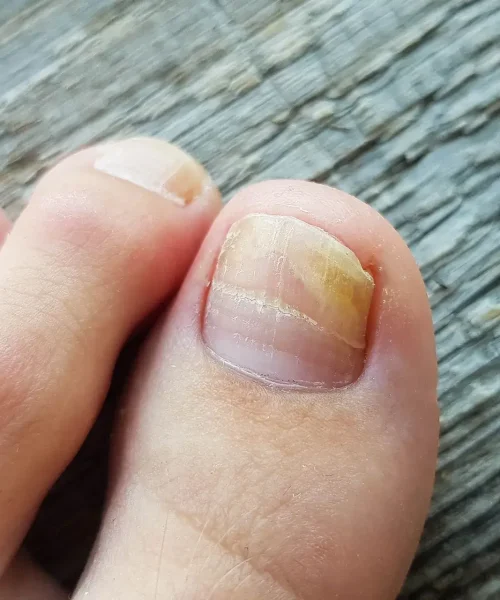Fungal Nails Infection Treatment in Adelaide
Have you noticed that your nails are getting thicker or showing a yellow or white color? This could be a sign of a fungal nail infection. Fungal nails infections can affect both fingernails and toenails, often starting as a small change that grows over time.
Risk Factors of Fungal Nails Infection
Several factors may increase the chance of developing a fungal nail infection, including:
- Using public swimming pools
- Injuries or damage to the nails
- A weak immune system
- Wearing closed shoes for long periods
One common type of infection, known as onychomycosis, typically develops slowly. Over time, you may start noticing changes in your nails, especially in warm, damp areas where fungal infections tend to thrive. Since feet are often in warm and humid environments, fungal infections are more common on toenails than fingernails. If untreated, a fungal infection may even lead to issues like hammer toe.
At Keep Me Walking Podiatry in Adelaide, we offer effective fungal nail infection treatment to help clear up infections and prevent them from coming back. We provide treatments for everyone, including child fungal nail infection treatment and chronic fungal nail infection treatment. We also offer options like Excilor treatment for fungal nail infections, which can be applied at home for convenience.

Why Choose Us for Your Care?
At KMW Podiatry, we provide exceptional podiatry services across Adelaide, ensuring every patient receives personalized, high-quality care.
Health Scheme Support
We support patients under Work cover, GP care, NDIS, DVA, SAH, and other government schemes, providing consistent care for everyone.
Latest Technologies
We adopt the latest technologies to offer advanced podiatric care, providing innovative solutions for your foot health.
Convenient Locations
With clinics In stand-alone locations, GP Medical centers and Home Visits, our services are easily accessible, making it convenient for you to receive top-notch care.
24/7 Emergency Help
We are available around the clock for emergency assistance, ensuring you get the help you need whenever you need it.
Treatment Options for Fungal Nail Infection
For those with fungal nails infections on their fingers, we offer finger nail fungal infection treatment. We also treat fungal nails infection on toe nails and provide fungal nails infection home treatment guidance to help you manage the infection effectively.
Call us today at 1800962113 to book an appointment and take the first step toward healthier, fungus-free nails.
FAQs for Fungal Nails Treatment Adelaide
What is a fungal nails infection?
A fungal nails infection, also known as onychomycosis, is a common condition that occurs when a fungus infects the nails on the hands or feet. The infection typically begins as a white or yellow spot under the tip of the nail and can spread to other nails if left untreated. The condition can be caused by several different types of fungi, and is more common in people who have weakened immune systems, diabetes, or circulation problems.
Three important pieces of information about fungal nail infections are:
Fungal nails infections are a common condition that can affect both the fingernails and toenails.
If left untreated, a fungal nail infection can spread to other nails or lead to more serious complications.
People who have weakened immune systems, diabetes, or circulation problems are more likely to develop a fungal nail infection.
What are the symptoms of a fungal nail infection?
The symptoms of a fungal nail infection can vary depending on the severity of the infection, but may include thickened or discolored nails, distorted nail shape, brittle or crumbly nails, and a foul odor. In some cases, the infected nail may separate from the nail bed, causing pain and discomfort.
Three important pieces of information about the symptoms of fungal nail infections are:
Symptoms of a fungal nail infection can vary depending on the severity of the infection, but may include thickened or discolored nails, distorted nail shape, and brittle or crumbly nails.
In some cases, the infected nail may separate from the nail bed, causing pain and discomfort.
A foul odor from the affected nail is also a possible symptom of a fungal nail infection.
How are fungal nail infections diagnosed?
A fungal nail infection is typically diagnosed based on a physical examination of the affected nail and a review of the patient’s medical history. In some cases, a sample of the infected nail may be taken for laboratory analysis to confirm the presence of a fungal infection.
Three important pieces of information about the diagnosis of fungal nail infections are:
A fungal nail infection is typically diagnosed based on a physical examination of the affected nail and a review of the patient’s medical history.
In some cases, a sample of the infected nail may be taken for laboratory analysis to confirm the presence of a fungal infection.
It is important to see a healthcare provider for an accurate diagnosis and proper treatment of a fungal nail infection.
What types of arthritis affect the foot and ankle?
Fungal nail infections can be prevented by practicing good foot and hand hygiene, avoiding exposure to moist environments, wearing protective footwear in public areas such as showers or swimming pools, and avoiding sharing nail clippers or other personal grooming tools.
Three important pieces of information about the prevention of fungal nail infections are:
Fungal nail infections can be prevented by practicing good foot and hand hygiene, such as keeping nails clean and dry, trimming nails regularly, and avoiding biting nails.
It is important to avoid exposure to moist environments, such as communal showers, swimming pools, and locker rooms, where fungi can thrive.
It is also important to wear protective footwear in public areas and avoid sharing nail clippers or other personal grooming tools to prevent the spread of fungal infections.
